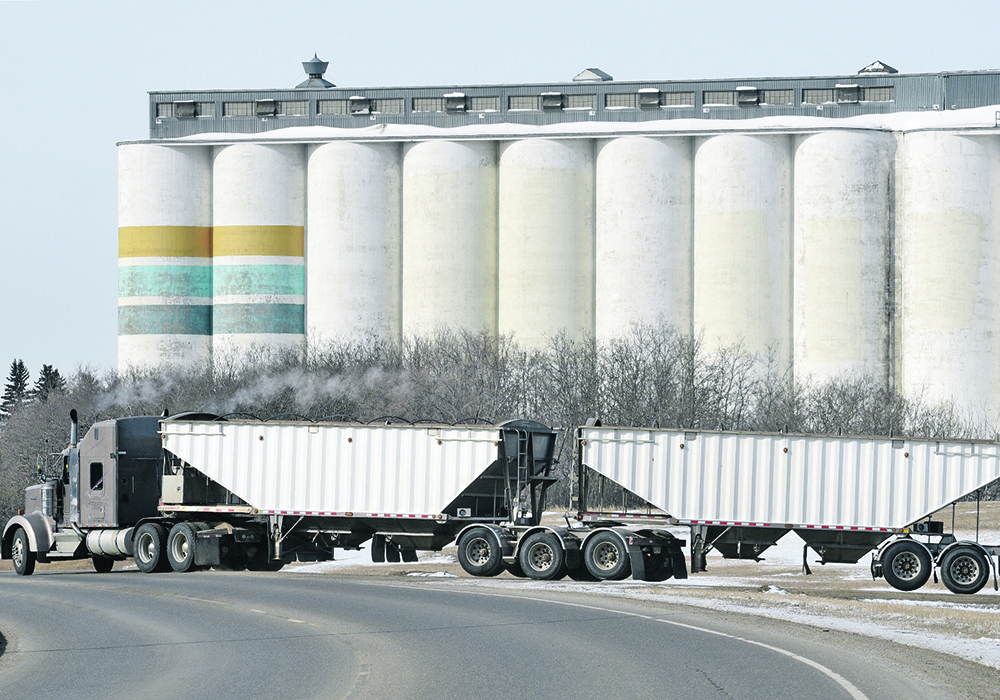Producers would be given seven days to decide whether to dispute a grade and would no longer need to be present when samples are taken
The Canadian Grain Commission is proposing important changes to a decades-old program designed to ensure farmers are fairly compensated for the grain they deliver.
The commission’s Subject To Inspector’s Grade and Dockage service, also known as Subject To, has been in place since grain growers were using single-axle trucks with wooden boxes to deliver their grain to prairie elevators.
The service allows producers to challenge the grade and dockage determinations that grain buyers or elevator agents assign to a delivery.
If a grain grower disagrees with a buyer’s grade and dockage assessments, the grower can request that a representative sample of the load be taken and sent to the grain commission for binding arbitration under Subject To provisions.
Read Also

Russian wheat exports start to pick up the pace
Russia has had a slow start for its 2025-26 wheat export program, but the pace is starting to pick up and that is a bearish factor for prices.
The commission assesses samples collected in the presence of the producer, and a binding decision on grade and dockage is rendered.
Remi Gosselin, manager of corporate information services at the grain commission, said Subject To Inspector’s Grade and Dockage is not a widely used service.
On average, 250 to 300 requests for binding arbitration are received by the commission each year, Gosselin said.
However, the service is an effective dispute resolution mechanism, and a favourable ruling can mean a lot more money in the producer’s pocket.
“It’s not a service or a producer right that’s (used) on a regular basis,” Gosselin said.
“There are other tools in a producer’s toolkit that (can be used) if they’re not satisfied with the grade and dockage that they’re going to receive … but once grain has been delivered, Subject To is considered to be an important pressure valve in the system.”
Growers and grower organizations raised concerns about the Subject To Inspector’s Grade and Dockage program during a recent review of the Canada Grain Act and the operations of the commission.
Some growers suggested the program’s regulations, which were developed decades ago, have not kept pace with the rapidly evolving commercial grain handling industry and may no longer be providing adequate protection to all growers.
“What we learned in recent consultations … is that existing Subject To provisions are too narrow and don’t accurately reflect current practices in the … commercial grain handling system,” Gosselin said.
“Really, what we’re doing here, is we’re responding on that need for change from producers.”
Growers are now required to decide immediately, at the point of delivery, if they wish to dispute grade and dockage determinations, but the commission proposes giving them seven days.
As well, growers would no longer need to be present at the point of delivery to request CGC arbitration, and elevators would be required to collect a sample from every load they received and retain them for at least seven days.
The grain commission will accept feedback on the proposed changes until Feb 28.
If the changes are to be implemented, the commission would like to see them in place by Aug. 1, 2022, in time for the 2022-23 crop year.
Gosselin said the proposed changes are intended to bring Subject To provisions in line with today’s commercial grain handling system.
For example, the requirement that a producer must be present at the time of delivery to request a binding determination can, in many cases, limit the producer’s ability to use the program.
“That’s just not feasible in the current operational environment because more and more, producers are relying on commercial truckers to make deliveries on their behalf,” Gosselin said.
Under the proposed changes, “producers would not need to be present and would have up to seven days to trigger “Subject To” arbitration,” he added.
The proposed seven-day dispute window is designed to ensure that all growers have reasonable access to dispute resolution services.
Gosselin acknowledged the expanded seven-day trigger could increase grain buyers’ administrative responsibilities.
Elevators are now required to collect samples of delivered grain, but the rules on how long samples must be retained is unclear.
Wade Sobkowich, executive director of the Western Grain Elevators Association, said members are reviewing the proposed changes and will provide feedback to the commission.
In general, though, elevator companies support the Subject To Inspectors Grade and Dockage program and respect producers’ right to use an effective dispute resolution mechanism, he added.
“We don’t have our comments fully figured out at this point … but first of all, it’s important to point out that the WGEA and our members support the Subject to Inspector’s Grade and Dockage provisions, as well as the farmer’s right to submit a sample to the CGC,” Sobkowich said.
“So it makes sense to have a process in place that recognizes the way the industry has changed and the way that farmers deliver their grain to an elevator.”
Sobkowich said WGEA delivery locations are already collecting grain samples as part of the producer declaration system, in which growers are required to accurately declare the class or variety of grain being delivered.
Based on early feedback, there is no indication that there will be significant opposition to the changes, Gosselin added.
“So far, the feedback that we’ve received is fairly unanimous in terms of support,” he said.
Feedback on the proposed changes can be submitted to the CGC by mail, email or facsimile.
Growers can visit the Grain Commission’s website for details on how to submit feedback.
















